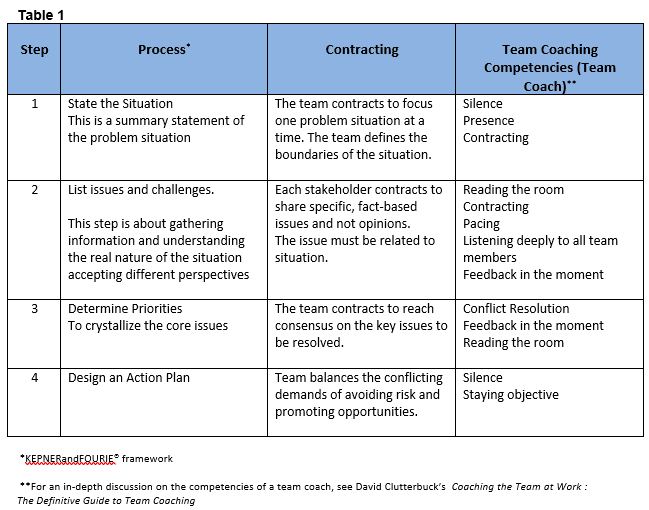Team Coaching for Better Outcomes
Organizations need to get better at decision-making. “Half of all decisions in organizations fail,” says Professor Paul C. Nutt, of the Department of Management Science, Ohio State University, in a journal article. He studied 365 decisions in medium and large organizations to find if the organizations had implemented these decisions and if they were robust enough to meet the original objectives for two years or more. He discovered that of 271 decisions by decree, only 10% achieved these objectives while being implemented, and of the 85 decisions where teams collaborated, 93% were successful in achieving their outcomes.
Paradox of Control
Why do teams that collaborate outperform? Professor Nutt’s research reveals that these teams involve all stakeholders, do not rely on preconceived solutions, and will explore all available options, as well as their managers willingly cede authority to the team.
Most managers are aware of participation strategies but are unwilling to give up control. Participation also takes more time. The paradox is that managers who give up control get more control and have more time to get things done.
Context for Team Coaching
“Team coaching is a comprehensive and systemic approach to support a team to maximize their collective talent and resources to accomplish the work of the team,” according to Drs. Jacqueline Peters and Catherine Carr in High Performance Team Coaching: A Comprehensive System for Leaders and Coaches.
To outperform, teams need to manage the paradox of control. Collaboration is key.
I use a four-step process of divergent and convergent thinking which, by design, ensures that all information shared by the stakeholders is visible and open.
Divergent thinking is about gathering all the relevant information and to break a multidimensional/complex problem down into smaller, manageable components/parts. Convergent thinking reflects a person’s tendency to analyze relationships between several parts of a problem and to find useful links/connections or patterns.
The process steers the team to their stated goal while encouraging everyone in the team to communicate, surface disagreements and resolve differences to implement decisions.
The applications of this approach to team coaching are widespread, especially for complex situations where collaborative teams need to decide quickly or when teams need to prioritize a situation to find the starting point, manage risks, find the root cause of the problem and then find a solution.
Divergent and Convergent Model
For better outcomes, choosing the right stakeholders/team members at the outset is a critical step and is frequently overlooked in my experience. I often find that the coaching conversation that I have with the team manager on selecting stakeholders has an important bearing on the outcome.
When teams don’t collaborate, they diverge too much and converge too soon, leading to poorly thought-out action plans and a low commitment to implement the decision. The following four steps ensure the right balance of divergent and convergent thinking leading to quality decision-making:
- State the situation.
- Gather information and list issues.
- Analyze and determine priorities.
- Arrive at a conclusion and design an action plan.
At every step of the process, the team agrees on outcomes and expected collaborative behaviors. It is this focus that allows teams to give their best.
Please refer to Table 1.
Task: To prioritize and agree on a starting point for implementation in a complex situation.

Key Learning
Team coaching is an ongoing relationship with the entire team and demands more in terms of energy, passion and skills, as compared to one-on-one coaching. For example:
- It is common for team members to be at different stages of thinking about the problem. I had to learn to listen to the person talking and to everyone else in the room to prevent this difference in pace from becoming a source of conflict.
- Each step can seem like a different coaching conversation, from contracting challenges to changes in the team and the dynamics. The coach must read the room and pay very close attention.
- It is essential to coach team leaders in the moment. They do overtly influence the thinking of the team given their position, expertise or personality.
- Do not get “lost” in the process facilitation; coaching for outcomes is equally important.
Teams comfortable with divergent and convergent thinking, spend less time in meetings and yet have a high commitment to the outcomes. (Teams have reportedly achieved better outcomes with two sessions of 90 minutes as opposed to a day or more, which the teams would have planned for earlier.) In a radically uncertain world, team coaching can help organizations get better at implementing decisions.



Hello Prasad,
Thank you for sharing this article. I reflected on my own team coaching practice, and found that Paradox of Control, Contracting part (from David Clutterbuck’s book) are supplementing very well to my practice.
Yorde L.
Thanks Yorde. I find understanding the Paradox of Control as a major shift that needs to take place in the team to move forward. The contracting at every step this process raised the level of engagement in the team. Would be happy to discuss this more.
It is a valuable article showing the process of team coaching. I have changed from the 4 hour sessions to 90 minutes, however I’m having a dificult time reading the room, in this time of virtual connections. Have you had any experience in virtual team coaching that could help?
Thanks for sharing!
Hi Laly, I am glad you liked this article. This is a great question. Virtual team coaching can be even more challenging, however 90 min is the right duration and I keep the size of the team small. 6 to 8 works best. To read the room, it’s important to see all of them in the gallery view if you are using zoom and then go about the team coaching in much the same way as before. The process and the approach will not change. Hope this helps!